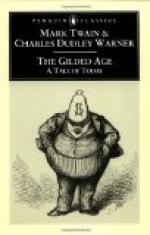These neighbors stood a few moments looking at the mail carrier reflectively while he talked; but fatigue soon began to show itself, and one after another they climbed up and occupied the top rail of the fence, hump-shouldered and grave, like a company of buzzards assembled for supper and listening for the death-rattle. Old Damrell said:
“Tha hain’t no news ’bout the jedge, hit ain’t likely?”
“Cain’t tell for sartin; some thinks he’s gwyne to be ’long toreckly, and some thinks ’e hain’t. Russ Mosely he tote ole Hanks he mought git to Obeds tomorrer or nex’ day he reckoned.”
“Well, I wisht I knowed. I got a ’prime sow and pigs in the, cote-house, and I hain’t got no place for to put ’em. If the jedge is a gwyne to hold cote, I got to roust ’em out, I reckon. But tomorrer’ll do, I ’spect.”
The speaker bunched his thick lips together like the stem-end of a tomato and shot a bumble-bee dead that had lit on a weed seven feet away. One after another the several chewers expressed a charge of tobacco juice and delivered it at the deceased with steady, aim and faultless accuracy.
“What’s a stirrin’, down ’bout the Forks?” continued Old Damrell.
“Well, I dunno, skasely. Ole, Drake Higgins he’s ben down to Shelby las’ week. Tuck his crap down; couldn’t git shet o’ the most uv it; hit wasn’t no time for to sell, he say, so he ’fotch it back agin, ‘lowin’ to wait tell fall. Talks ‘bout goin’ to Mozouri—lots uv ‘ems talkin’ that-away down thar, Ole Higgins say. Cain’t make a livin’ here no mo’, sich times as these. Si Higgins he’s ben over to Kaintuck n’ married a high-toned gal thar, outen the fust families, an’ he’s come back to the Forks with jist a hell’s-mint o’ whoop-jamboree notions, folks says. He’s tuck an’ fixed up the ole house like they does in Kaintuck, he say, an’ tha’s ben folks come cler from Turpentine for to see it. He’s tuck an gawmed it all over on the inside with plarsterin’.”
“What’s plasterin’?”
“I dono. Hit’s what he calls it. ’Ole Mam Higgins, she tole me. She say she wasn’t gwyne to hang out in no sich a dern hole like a hog. Says it’s mud, or some sich kind o’ nastiness that sticks on n’ covers up everything. Plarsterin’, Si calls it.”




